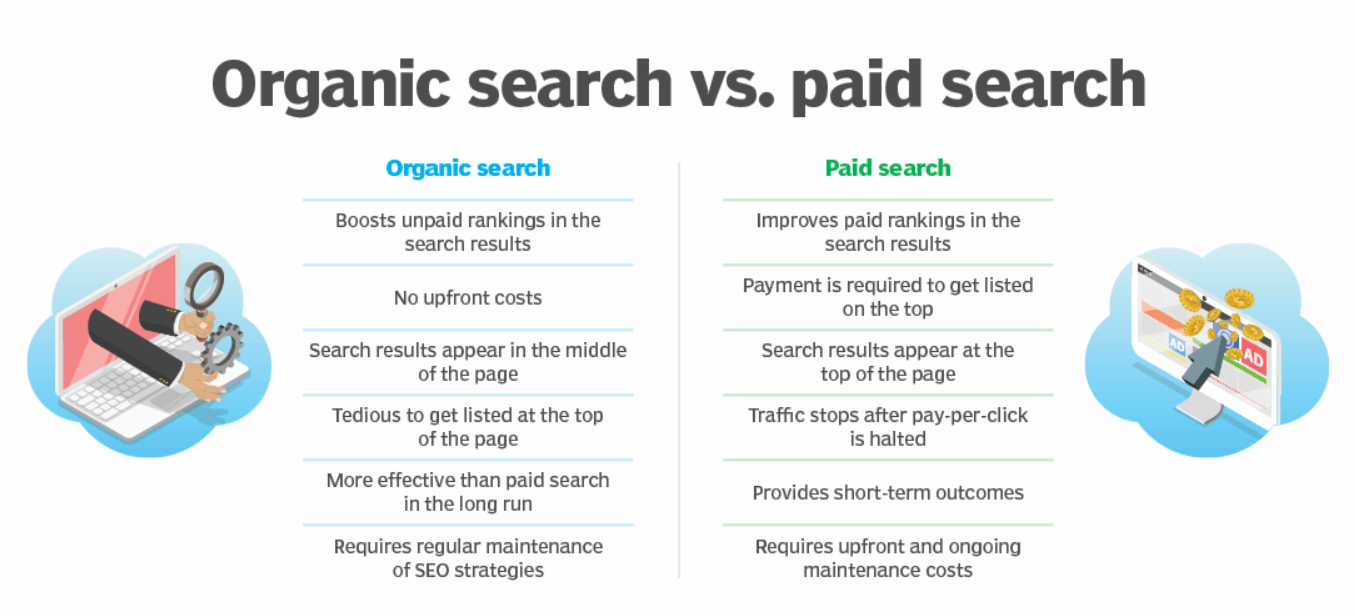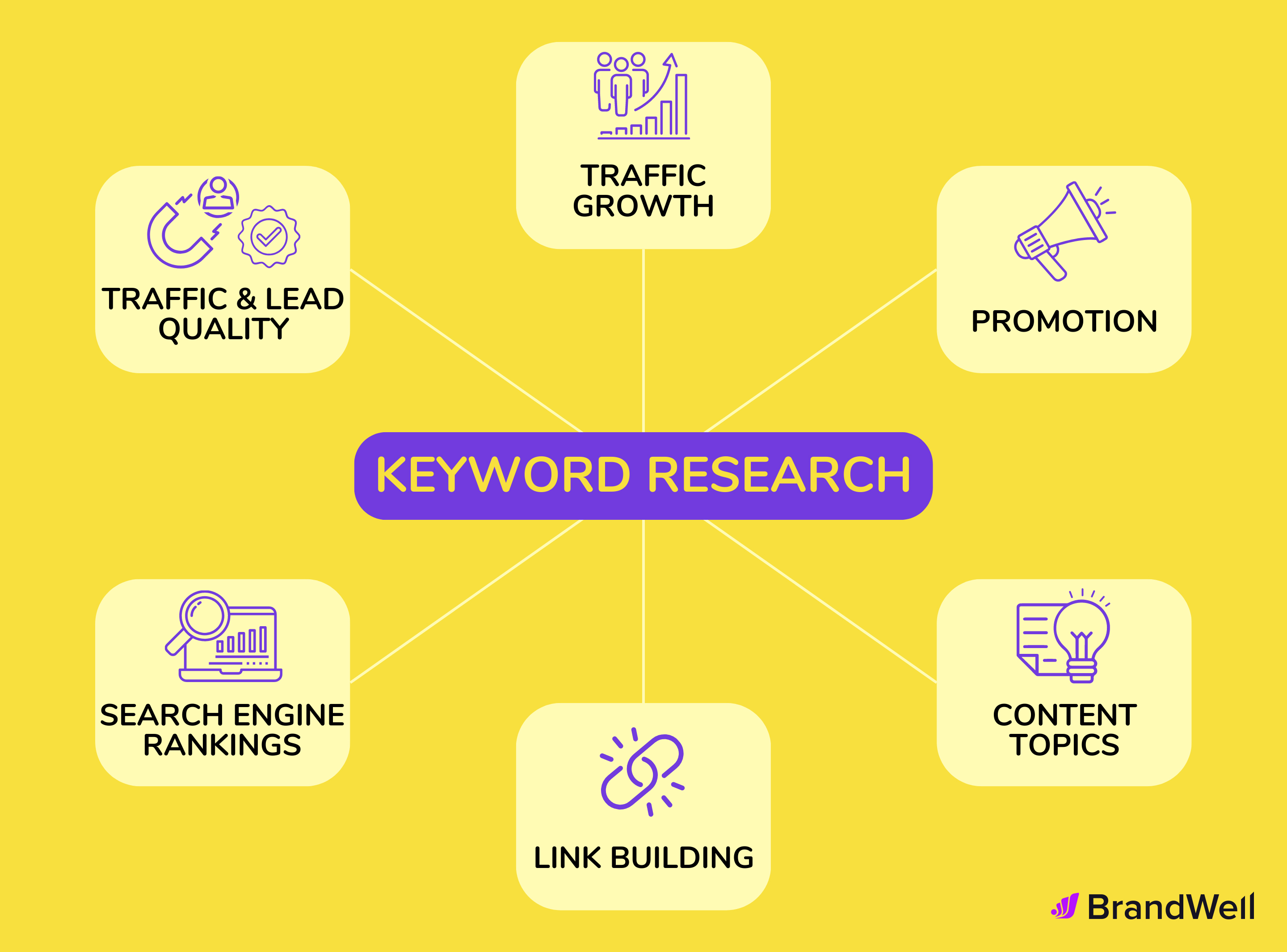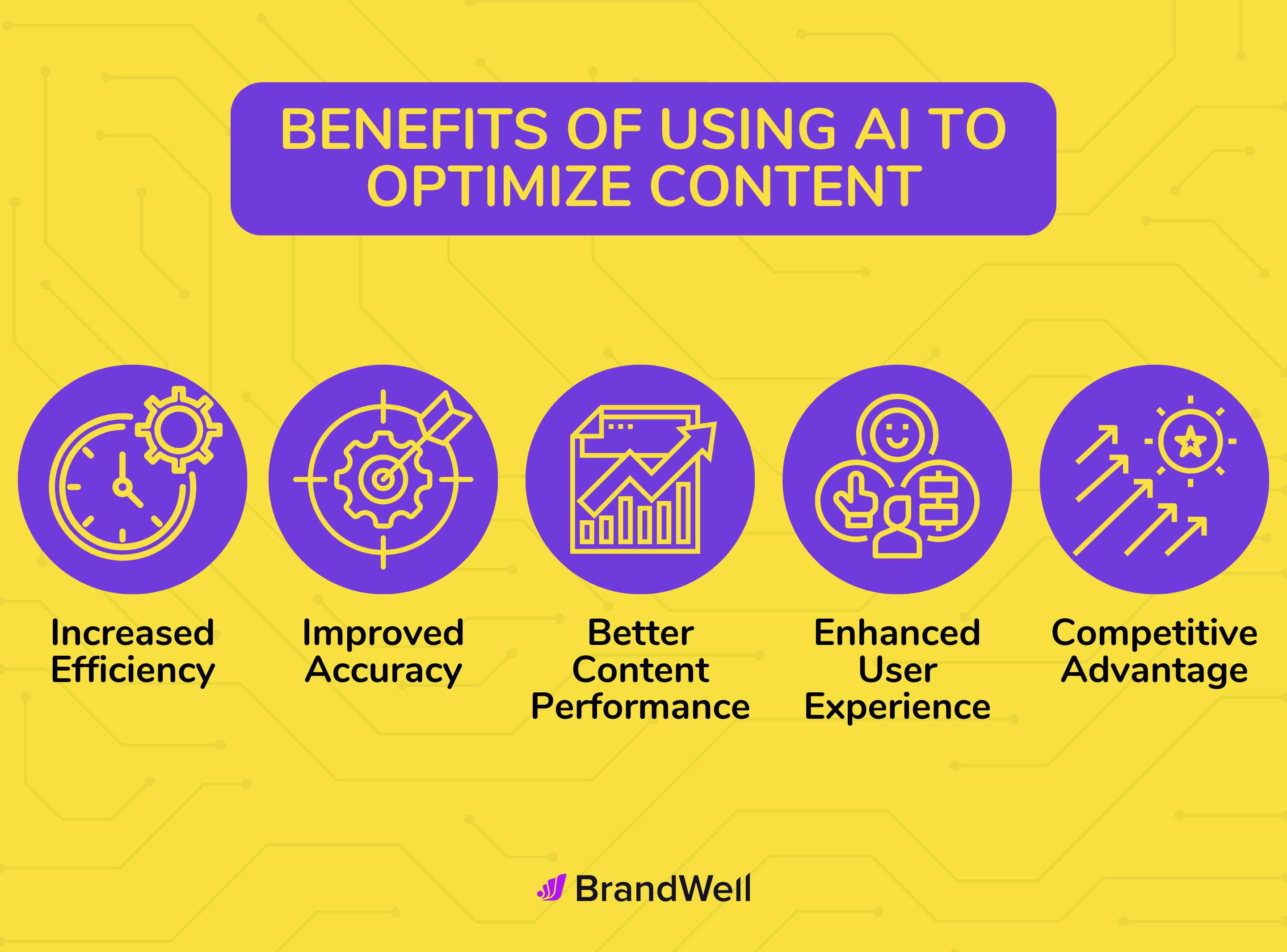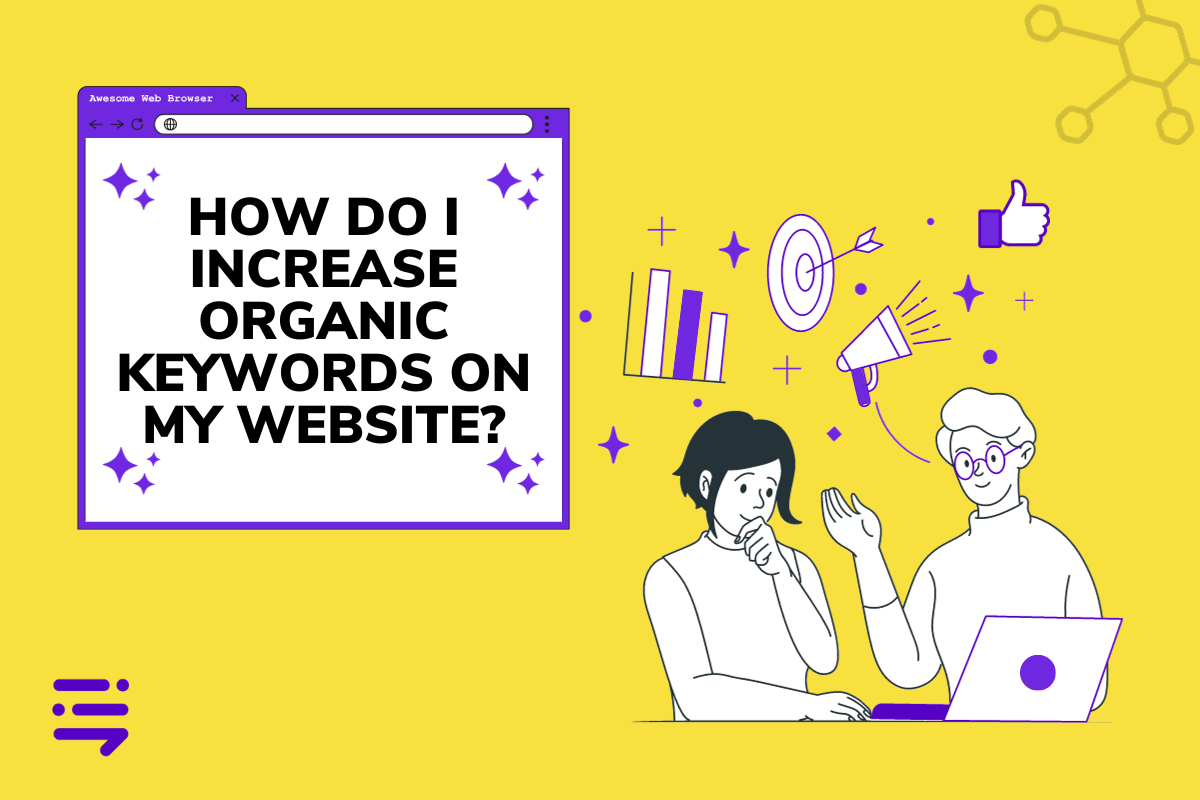Picture this: you have a website that’s overflowing with gripping material and dazzling visuals. Yet, traffic barely trickles in. You scratch your head wondering where it all went wrong.
The culprit? Lack of organic keywords.
How do I increase organic keywords on my website?
Before we answer that question, let’s talk about what are organic keywords.
Organic keywords refer to the words and phrases that people naturally use when searching for information on search engines. These are the terms your customers type into the search bar to find relevant websites, products, or services.
For instance, if someone is looking for information on “best hiking boots,” then “best hiking boots” is the organic keyword they might use in their search. If you have a website that provides information or sells hiking boots, optimizing your content for this keyword can help your site appear higher in search engine results when someone searches for that specific term.
Organic keywords are different from paid keywords, which are part of pay-per-click (PPC) advertising campaigns. With PPC, advertisers bid on specific keywords, and their ads are displayed at the top or bottom of search engine results when someone searches for those terms.
The goal of optimizing for organic keywords is to improve your website’s visibility in search engine results pages (SERPs) without paying for placement.
Organic keywords play a crucial role in content marketing. When used correctly, organic keywords can be instrumental not only in increasing search ranking but also in improving the user experience.
No more relying heavily on paid ads when you have organic rankings doing the job!
Scroll down to learn how to increase organic keywords on your website.
Table Of Contents:
- The Importance of Organic Keywords
- Keyword Research and Analysis
- Creating Quality Content
- Mastering On-Page SEO Optimization
- Building Backlinks and Authority
- Technical SEO
- Leveraging Social Media for Content Promotion
- FAQs – How Do I Increase Organic Keywords
- Conclusion
The Importance of Organic Keywords
In the world of SEO, organic keywords carry immense weight as they can significantly improve your site’s visibility. If you use relevant organic keywords in your content, it becomes easier for search engines to understand what your page is about and rank it accordingly.
Given the limited visibility of websites beyond the first page of search results, keyword placement can be used strategically to increase chances for users to find your website.
How Search Engines Use Organic Keywords
Apart from helping visitors locate relevant information quickly, organic keywords also serve as markers guiding search engine bots through the vast expanse of internet data while indexing pages.
Search engines like Google deploy complex algorithms to scan every bit of text on a webpage looking for repeated patterns or phrases. Once identified, these phrases become instrumental in deciding where a web page should land within SERPs.
Fueling Traffic with Strategic Keyword Placement
Your primary goal? Get more eyes on your content. This happens effectively when we smartly integrate appropriate organic keywords into our content. Doing so helps search engines better understand our content and position it where potential visitors can easily find it.
By weaving organic keywords naturally into your content, you make sure that both the users and search engines perceive your page as relevant and valuable to a particular query or topic. And guess what? The more relevant your page appears, the higher its chances of climbing up those coveted SERP ranks.

Screenshot from TechTarget
Keyword Research and Analysis
To increase organic keywords, understanding keyword research is pivotal. It’s a crucial component of SEO that can greatly influence your search ranking.
A keyword research tool like BrandWell can help you identify high-volume and low-competition keywords.
The goal here isn’t just to find any words but to seek out the ones that are highly relevant to your content and business. By identifying terms that align with what users search on Google, you can draw more organic traffic from popular searches.
Moreover, it’s not enough just knowing which keywords have the highest search volume; one should also understand their competition level. In fact, sometimes it might be a good idea to target long-tail or specific keywords as they tend to have less competition despite having lower volumes compared to primary keywords.
Bear in mind: chasing after every trending keyword won’t necessarily improve your site’s rank if those aren’t directly related to what you offer. Be sure to choose organic keywords that resonate with potential customers’ queries.

Creating Quality Content
The key to enhancing your organic search ranking lies in crafting high-quality content. But what does quality content mean? It’s not just about producing text that is grammatically correct and free of spelling errors, although those are certainly important factors.
A significant part of creating quality content involves understanding your buyer persona. This means knowing who your customers are — their challenges, goals, and preferences — and using this information to tailor your content to meet their needs effectively.
Crafting Engaging Content with Relevant Keywords
Incorporating relevant keywords into your engaging material can boost its visibility on Google search results. Yet remember — stuffing articles with keywords will not get you far. Your focus should be more on long-tail keywords which are specific phrases users search for online. These have a lower search volume but higher conversion rates due to less competition compared to generic terms.
Furthermore, the concept of relevance extends beyond just inserting appropriate words or phrases into a piece of writing. Ensure that your copy speaks directly to the user intent behind the keyword queries.
The goal here isn’t merely improving rankings; it’s also about building trust between you and your audience.
Want to create content that speaks to your audience? BrandWell is a powerful brand growth platform that can produce hundreds of blog posts in your own tone of voice — incorporating organic keywords that are relevant to your business while bypassing all plagiarism scanners and AI detectors out there.

Maintaining Relevance & Consistency: A Balancing Act
An additional consideration when incorporating relevant organic keywords is maintaining consistency throughout all aspects of your blog post, from title tags to meta descriptions. Remember, quality content is not only about being engaging but also informative and consistent.
You’re not just churning out words. You’re crafting valuable content that speaks to your audience’s needs and aligns with smart keyword strategies. It’s about quality, relevance, and strategic SEO – a trifecta for successful content creation.
Mastering On-Page SEO Optimization
To boost your organic search ranking, understanding and applying on-page SEO techniques is crucial. These strategies revolve around optimizing elements within your website that you can control directly.
The Power of Title Tags
Title tags play a significant role in attracting the attention of users while signaling to search engines about the content’s relevance to specific keywords. An engaging title tag not only captivates user interest but also improves click-through rates from search results.
Unlocking Potential with Meta Descriptions
A well-crafted meta description serves as an advertisement for your page. This snippet, which appears under your URL in search engine results, should summarize what visitors will find when they visit your site. Remember, compelling meta descriptions often lead to higher click-through rates (CTR).
Leveraging Header Tags for Structure & Relevance
Header tags help structure your content, making it easier for readers to navigate through different sections of a blog post or web page while offering keyword-rich context about each section’s contents.
Pictures Are Worth a Thousand Words: Alt Tag Use
An alt tag or alternative text describes an image’s contents, providing vital information used by screen reader software and aiding search engines’ comprehension. They serve as important markers allowing images to rank in Google Images searches too.
Bridging the Gap with Internal Links
Internal links connect your content and give search engines an idea of your website’s structure. They establish a hierarchy on your site, allowing you to give the most important pages more link value than less valuable ones.
Focusing on these key elements — title tags, meta descriptions, header tags, image alt tags, and internal linking — can significantly enhance your on-page SEO efforts. Implementing these strategies will surely provide a strong foundation for improving organic keyword visibility.
Building Backlinks and Authority
The role of backlinks in your site’s organic ranking cannot be understated. They are like votes of confidence from other websites, telling search engines that your content is valuable and trustworthy.
But not all links carry the same weight. Links from authority sites hold more sway because they’ve earned their reputation over time by consistently publishing high-quality content.
So how do you build these precious assets?
Gaining Trustworthy Backlinks
Achieving quality backlinks begins with creating great content others want to link to; this is where our content creation strategies come into play.
Your goal should be to write original, engaging pieces that answer questions or solve problems for users searching specific keywords relevant to your business niche.
Reaching Out To Authority Sites
Beyond just crafting good articles or blog posts, it’s a smart move to reach out directly to influencers within your industry who can help amplify your message through their established networks.
The Role of Anchor Texts in Building Links
An important aspect of building backlinks is using appropriate anchor text — the clickable text in a hyperlink. It tells both readers and search engine bots what kind of page they’re being led towards and contributes significantly towards improving SEO rankings when done right.
Checking your link profile regularly helps ensure you maintain an effective mix of anchor texts without appearing spammy.
Remember though: acquiring these coveted backlink treasures isn’t about short-term gains but long-term growth. And while it’s not easy — nothing worthwhile ever is — the rewards in terms of increased organic rankings make it well worth the effort.
Technical SEO
Optimizing your website for technical SEO involves fine-tuning various elements to ensure search engines can crawl and index your site efficiently. It includes aspects such as website speed optimization, mobile responsiveness, structured data markup implementation, and more.
Website Speed Optimization
Page loading time can have a major effect on the user experience. Google’s algorithms also take it into account when ranking websites. Therefore, improving your website’s load speed is crucial in enhancing its organic ranking.
A sluggish website not only deters users but could potentially harm your site’s organic rankings too. To avoid this issue, you might want to look into solutions like optimizing images or leveraging browser caching.
Mobile Responsiveness
In today’s digital age where most searches are made from mobile devices, having a responsive design isn’t just good practice; it’s an absolute must. A mobile-friendly layout enhances the customer experience, which indirectly boosts the likelihood of higher engagement rates and conversions — both vital factors for improving SEO.
Crawlability Enhancement
‘Crawlability’ refers to how easily search engine spiders can navigate through a website and index its content effectively. If Google bots cannot crawl your site properly due to issues like broken links or improper redirects, it will affect the indexing process negatively, thereby impacting overall organic keywords visibility.
Structured Data Markup Implementation
Implementing structured data markup, often referred to as ‘schema markup,’ is another essential part of technical SEO. It helps search engines understand your content better by providing explicit clues about the meaning of a page.
While not directly a ranking factor, schema markup can enhance your website’s appearance in SERPs with rich snippets and thus improve click-through rates.
Leveraging Social Media for Content Promotion
Increasing the visibility of your organic keywords is crucial, and content promotion on social media can play a vital role in achieving this goal.
Social media networks such as Facebook, Twitter, and Instagram have become a part of our everyday lives — not just for communication but also for content promotion to increase organic visibility. But they’re more than mere communication tools; they’re potential gold mines for marketers looking to promote their content and boost their site’s organic ranking.
Determining the right demographic to target and what kind of content will be most appealing to them is essential for successful social media marketing. Are you targeting millennials? Instagram might be a good idea then because it’s popular among younger demographics.
If done right, social media marketing strategies not only increase website rank but also improve user experience as well by connecting audiences directly with brands they love or find interesting. And let’s not forget about search volume too: more social media shares mean higher visibility in Google search results.
To get started, you need to create share-worthy posts – ones that engage users enough so that they feel compelled to hit ‘share’ or ‘retweet.’
Here’s where buyer personas come into play — knowing exactly who you’re writing for helps you customize each post so that it fits perfectly with the interests and preferences of your target demographic.
So remember: a solid SEO strategy doesn’t stop at building links or creating keyword-specific blog posts. A well-rounded approach includes effective social media marketing that helps boost organic rankings too.
FAQs – How Do I Increase Organic Keywords
How can we increase organic traffic?
Boosting organic traffic demands a mix of quality content, smart keyword use, backlinks from authoritative sites, and technical SEO.
What is a good number of organic keywords?
A healthy website should aim for hundreds to thousands of relevant keywords. Remember that the focus isn’t quantity but relevance and search volume.
Why am I losing organic keywords?
Losing organic keywords could be due to Google updates or changes in user behavior. It’s important to regularly monitor your site’s performance and adjust strategies as needed.
What is the best way to increase keyword rank?
To improve keyword rank, focus on creating engaging content around those words, getting high-quality backlinks, optimizing on-page elements like meta descriptions and tags, plus researching competitor tactics.
Conclusion
Boosting organic keywords on your website is not just about algorithms and technicalities; it’s about creating a valuable and engaging online experience.
By focusing on creating quality content, strategic optimization, and a user-centric approach, you’re not just chasing search engine rankings — you’re building a digital presence that resonates with your audience.
Remember, optimizing for organic keywords is a marathon, not a sprint. It requires dedication, consistent effort, and a willingness to adapt to the changing dynamics of the online world. Whether it’s through keyword research, on-page SEO, or user experience enhancements, each step contributes to the tapestry of your website’s success.
As you optimize your content with organic keywords, keep in mind that their true power lies not just in their ability to attract search engine attention but in their capacity to connect with real people seeking information, solutions, or products.
Start producing authentic, relevant, and keyword-rich blog posts with BrandWell, and watch your website organically climb the SERPs.




